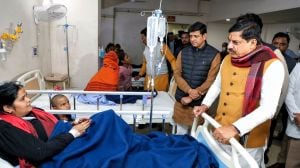Mobility costs 8212; Local call, STD rates
MUMBAI, MAY 13: Cellphone subscribers are just waking up to the price of the technology. While the automatic roaming facility has given t...

MUMBAI, MAY 13: Cellphone subscribers are just waking up to the price of the technology. While the automatic roaming facility has given them the benefit of a single telephone number worldwide, it has also slapped expensive STD bills in addition to airtime charges.
Film director Mahesh Bhatt calls it roaming rip-off. A Mumbai subscriber who travels to Delhi expecting to make full use of his mobile8217;s roaming facility ends up paying STD rates on all calls he gets on his cell. Any call to his mobile phone from Mumbai to Delhi would translate to airtime charges plus STD charges from Mumbai to Delhi. Similarly any call from Delhi would attract STD charges because it would be routed from his home network, Mumbai.
Max Touch, one of the cellular operators for Mumbai, explained it thus, quot;In order to provide automatic roaming to our subscribers we have to follow international GSM group systems mobile standards, and hence routing of all incoming calls from home network is the standard GSM norm. This does result inadditional STD/ISD legs and hence, additional cost for subscribers.quot;
quot;Nobody knows about it as yet,quot; said builder Niranjan Hiranandani. Hiranandani, who has roaming in four cities, discovered the expensive value-add on a chance trip to Delhi. quot;They the operator converted it for free to auto roaming 8212; that free is becoming very expensive,quot; he said.
Subscribers like Bhatt and Hiranandani who are frequent travellers and need to interact with people in more than one city are the worst hit. And also the among the first to realise the downside of the quot;what is supposed to make life easierquot;. quot;You can be sure things are going to get more difficult when someone says that,quot; said Bhatt.
Kamini Sawhney, bureau chief of Star Plus, is more sober. quot;It is sad 8212; staying in the same city it has to be an STD. It makes a lot of sense to have a single number. The option has to be with the customer.quot;
However, cell phone operators have categorically ruled out going back to manual roaming. quot;We have sent letters to eachsubscriber telling him we are converting to automatic roaming. There is no question of going back to older technology. All operators have phased it out as on May 1,quot; said Sunil Mehta, general manager business development at Max Touch. A questionnaire to BPL Mobile, operator in Mumbai and Maharashtra circles, on whether they would consider re-introducing manual roaming, failed to elicit any response.
quot;You can8217;t call no option8217; a facility,quot; said Hiranandani after being chastened by three days of paying for STD calls at Delhi. For these subscribers, the recent drop in airtime rates by the Telecom Authority Regulatory of India, makes little difference. At Rs 21.80 per minute for a call from Mumbai to Delhi it works out to be even higher than the Rs 16.80 per minute operators used to charge for airtime when the service was first introduced.
quot;It is crazy thing,quot; said Sunil Kaloti who works in a software firm and has roaming facility for Maharashtra. Kaloti sees no need for either the caller or the recipientto pay for STD especially considering both are in the same city. The more inventive have decided to keep the auto roaming facility but also take separate SIM cards for the cities they frequent.
quot;The telephone is my lifeline 8212; I8217;m quite extravagant with it. But even I felt paralysed when I was at Delhi,quot; recalled Bhatt. Comedian Jaspal Bhatti has two words for it, quot;Totally nonsense.quot; It is a no-win situation even for the cell operators because the STD charges ultimately go to DoT or MTNL.
- 01
- 02
- 03
- 04
- 05






























